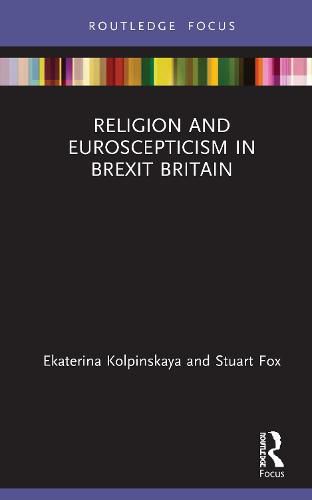Readings Newsletter
Become a Readings Member to make your shopping experience even easier.
Sign in or sign up for free!
You’re not far away from qualifying for FREE standard shipping within Australia
You’ve qualified for FREE standard shipping within Australia
The cart is loading…






Religion has a significant effect on how Europeans feel about the European Union (EU) and has had an important impact on how people voted in the UK’s ‘Brexit referendum’. This book provides a clear and accessible quantitative study of how religion affects Euroscepticism and political behaviour.
It examines how religion has affected support for EU membership since the UK joined the European Economic Community, through to the announcement of the Brexit referendum in 2013, to the referendum itself in 2016. It also explores how religion continues to affect attitudes towards the EU post-Brexit. The volume provides valuable insights into why the UK voted to leave the EU. Furthermore, it highlights how religion affects the way that citizens throughout Europe assess the benefits, costs and values associated with EU membership, and how this may influence public opinion regarding European integration in the future.
This timely book will be of important interest to academics and students focusing on religion and public attitudes, contemporary European and British politics as well as think tanks, interest groups and those with an interest in understanding Brexit.
$9.00 standard shipping within Australia
FREE standard shipping within Australia for orders over $100.00
Express & International shipping calculated at checkout
Religion has a significant effect on how Europeans feel about the European Union (EU) and has had an important impact on how people voted in the UK’s ‘Brexit referendum’. This book provides a clear and accessible quantitative study of how religion affects Euroscepticism and political behaviour.
It examines how religion has affected support for EU membership since the UK joined the European Economic Community, through to the announcement of the Brexit referendum in 2013, to the referendum itself in 2016. It also explores how religion continues to affect attitudes towards the EU post-Brexit. The volume provides valuable insights into why the UK voted to leave the EU. Furthermore, it highlights how religion affects the way that citizens throughout Europe assess the benefits, costs and values associated with EU membership, and how this may influence public opinion regarding European integration in the future.
This timely book will be of important interest to academics and students focusing on religion and public attitudes, contemporary European and British politics as well as think tanks, interest groups and those with an interest in understanding Brexit.